The monthly newsletters are a free offering to begin the month. I weave together musings, two poems (one by a published poet and one by me, as per a practice introduced to my master’s cohort by the poet Alice Oswald), and all my upcoming course and event announcements. Thanks for being here!
Listen via audio
Hello from the salty cliffside shores of Cornwall. I’m back in England for a little while, and am writing to you this week from Morrab Library, drinking take-out coffees (yes, plural) from the Honey Pot cafe down the road, and looking out on the botanical garden that surrounds the library in bursts of vital and bright, life-affirming green. Dylan Thomas’ force that through the green fuse drives the flower is alive and well in these parts. Probably because this is the neck of the woods where he got married and spent his honeymoon. I don’t blame him…
If you’ve been here with me for a while, you will have heard me mention this library before. It’s tucked away on the end of the train line of the winding wilds of the south west, in the old port town of Penzance. Established some two-hundred years ago in 1818, Morrab Library is one of the last two remaining private libraries in the UK. Basically, it is a hallow. A remnant of something old and honourable that is almost entirely invisible in the stampede of modern life.
This has been a haven for me since my folks first moved to Cornwall days before the pandemic hit. My relationship in the US had just ended, and this is where I took refuge during the lockdowns - which in the UK were brutal and ended up lasting, on and off, for 18 months.
When measures were loosened and the library opened again, I would come here every day. And I would sit in the deep blue room that holds the archives by the Hypatia Trust - a women’s small press and collection of works about women, by women - and write something or other. I wasn’t sharing any of my words then. They just filled my mountain of journals that have formed a fort around me since I was a kid.
Libraries are temples. There are many gods here. Shakespeare, Wordsworth, Thoreau, Jane Austen, Orwell, T. S. Elliot… Many worlds to offer libation to. And though life hums busy around it, somehow there is an orbit of stillness here. The quiet of night.
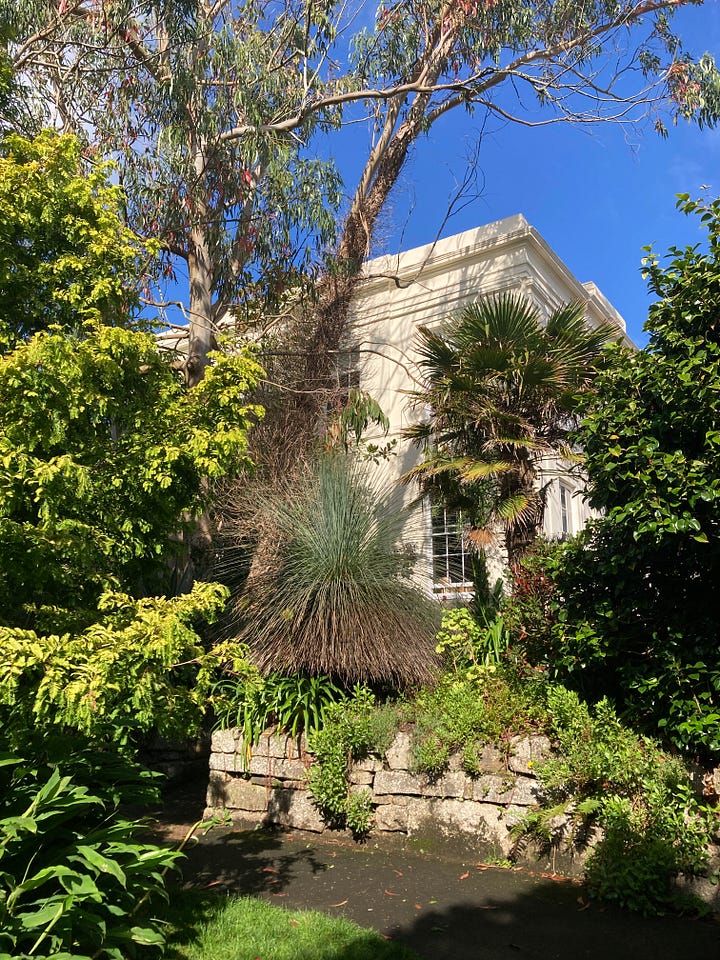
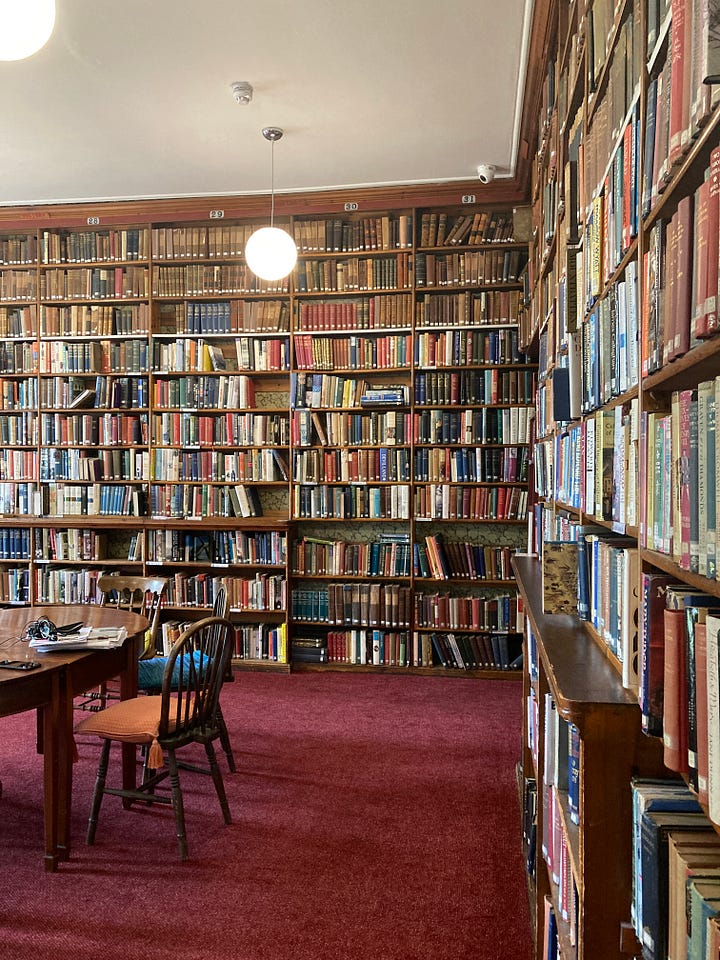
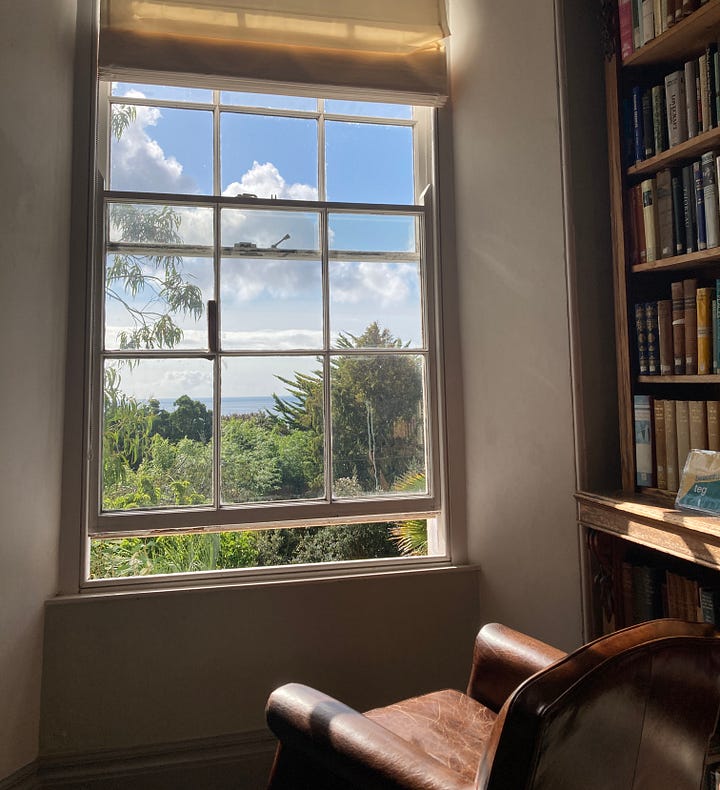
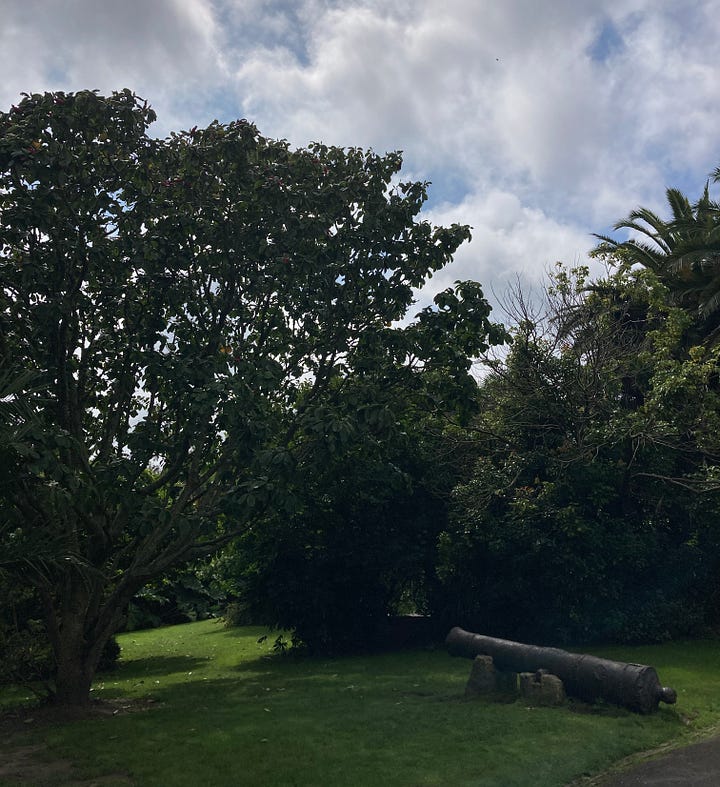
Libraries are the liminal spaces between the bustle of daily life and the imagination. Between the living and the dead. And when I come here, I wait to be claimed by these dead thinkers. To be informed by them. To catch a glimpse of their world and endeavour to know some of what they knew.
As I wait today, a collared dove flies onto a branch of a cherry tree in the gardens. And I start to write a poem which I will share below as one of two poems that I share each month as part of the monthly newsletters.
And then they arrive. With the opening act of feathers and wings now complete, I feel the buzz of something other, my thoughts not quite mine anymore and the room that was seemingly empty now full.
And I feel them leaning in, each pulling their thread that holds the tapestry of the imagination a little tighter. Over 70,000 books filled with their words old and directed at something of heart, of meaning to whomever sat on the other side of the pen and was troubled enough into communication; into activity, as Coleridge would say, bringing the whole soul into activity.1
Creativity, be it writing or any other art form, is the terrain of the soul. It is taking something, often from a disturbance in our own personal life, and creating from it. Phoenixes from ashes kind of thing.
Soul waits for us to break our leg, or be betrayed, or lose a loved one; something that disturbs and agitates the order of our life enough to bring us into activity. The Dagara elder Malidoma Somé once told me that when we break a bone, all our ancestral memory is able to flood into us; and we remember who we are, where we came from, and why we are here.
And when something breaks, we must exist in the place of becoming.
And that is no easy thing; to be both what could be and what once was. The possibility of a new life extending somewhere ambiguous and uncertain, and we stand at the threshold, not quite who we once were, not yet who we are to be; standing between the old self and something fresh and still undisclosed.
John O’Donohue describes the threshold as a line that separates two territories of spirit. Stemming from the word “thrashen”, meaning to separate the grain from the husk, it inspires us to, like the collared dove in the poem I will share below, pluck away at the debris in our lives and fly into the horizon of a new and more critical and challenging and worthy fullness.
Is it not, after all, the sign of a mediocre life to stay in the predictable comfort of the known, even when it becomes stale?
‘One has to be daring and brave,’ Lorca exclaimed in a letter to his father. ‘Mediocrity, the golden mean—those things are always fatal.’2
It is in this place of becoming, during the transformative stages of life, that the old friend doubt sets in. When we plateau and feel the prod of something nudging us, and the door to another opportunity in life reveals itself and its cost, it always asks us what we are willing to pay for it… And something always has to give.
And I think this is when the angel of doubt descends to shake things up. Because often the cost feels too great. And we want to turn back.
I refer to doubt as an angel because I think it can be a blessing in disguise.
Doubt is unsettling to the ego, and those who are drawn to ideologies that promise the dispelling of doubt by proffering certainties will never grow. In seeking certainty they are courting the death of the soul, whose nature is forever churning possibility, forever seeking the larger, forever riding the melting edge of certainty’s glacier.
- James Hollis, Finding Meaning in the Second Half of Life: How to Finally, Really Grow Up
The ego is not the soul decider of the outcome of our lives. To have some sense of doubt is to imagine that we will be surprised by something that could be even better than what we thought it could be.
Doubt makes space for grace. For the angel. For a metaphoric rather than literal interpretation of the world. But certainty is a real ego place. Jung wrote:
But you grow if you stand still in the greatest doubt, and therefore steadfastness in great doubt is a veritable flower of life. He who cannot bear doubt cannot bear himself. Such a one is doubtful; he does not grow and hence he does not live. […] The strong have doubt. But doubt has the weak. […] no one can say yes to his doubt, unless he endures wide-open chaos.3
When we don’t have the full picture, and we can’t quite see what’s ahead, sometimes the journey just has to be step by step. With slowness and lots of tender attention; resourcing ourselves with the things that settle our nervous systems so we don’t pull back. Or get stuck in doubt.
If we linger in this place for too long, our life will reflect that. The consequence of spending too much time with doubt is the gathering of more and more defences against the world. We end up walling ourselves in rather than opening up to the world.
Shakespeare called doubts “traitors”: ‘They make us lose the good we oft might win, by fearing to attempt,’ he wrote.

For a brief, interim period during an opportunity for transformation in our lives, doubt arrives as a catalyst. It can catapult us - if it is truly our wish and our will - to orient ourselves towards something more meaningful and impel us forward.
Because sometimes, we just have to head west, and hope that somewhere we’ll be met.
Poetry Offering
And now to the poetry offering. Here is one my a published poet, and one by me. This first one is by the Persian lyric poet Hafez (1325) from his collection of poems ‘Poems of Hope and Joy’.
I Heard God Laughing, Hafez
There is a Beautiful Creature
Living in a hole you have dug.
So at night
I set fruit and grains
And little pots of wine and milk
Besides your soft earthen mounds,
And I often sing.
But still, my dear,
You do not come out.
I have fallen in love with Someone
Who hides inside you.
We should talk about this problem--
Otherwise,
I will never leave you alone.And here is one of mine. I wrote this poem earlier this week while writing this piece in the library, and catching this scene between two collared doves in the gardens.
The destiny of doves
A collared dove perches
on the branch of a cherry tree
outside my window, her chest
puffed up and smooth
as she waits for her consort to arrive.
When he lands beside her,
he lifts his head first above hers,
towering and grand and solar,
and then lowers it, bowing, eyes to the gods
in the great below,
a simultaneous show
of dominance and submission.
She watches, swollen and secretive;
then turns her beak up
and flies away.
He doesn’t follow. Instead
he, too, turns away
and he prunes himself.
And as I watch
I think perhaps he will be better now;
perhaps now she will accept him.
But once he has extracted the debris
from the ruffles of his cloak
and his feathers are neat and orderly,
he takes off in the opposite direction.
Is there anything sadder?
I don’t think the gods are that interested in us
to send signs and maps
in our times of weakness and need
but I do think there is a great secret
that hums somewhere
at the heart of things
that whispers in rivers
and moonlight and cherry trees
and speaks to the delicate business that is
the destiny of doves.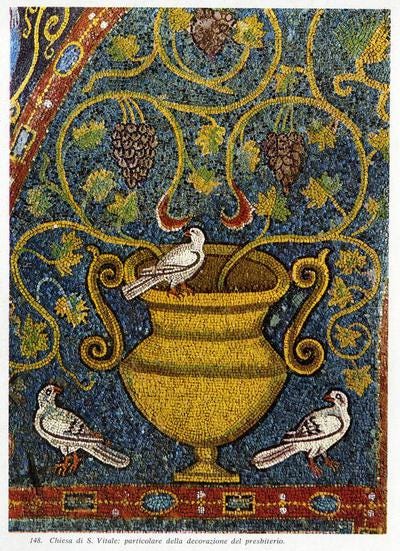
Announcements
As usual, I will be running the monthly New Moon Rite for women, and the Dismemberment Ceremony on the last Sunday of the month (open to all).
I will also be teaching the next round of the Bee Women Program, which is open by application only and begins on September 13th.
And finally I will be holding the seasonal ceremony on the autumn equinox offering guidance in the old oracular method, alongside my colleague Chelsy Arber.
Please scroll down for all the details.
—
UPCOMING CLASSES
The Bee Women | 3-Month Program | Begins September 13th
Oracular Guidance | Autumn Equinox
—
UPCOMING MONTHLY EVENTS
New Moon Rite | Sunday September 14th, 8 - 9:30pm UK | £22
Dismemberment Ceremony | Sunday September 24th, 8 - 9:30pm UK | £22
Coleridge, Biographia Literaria, Chapter 4, Lyrical Ballads and Poetic Controversy https://www.sjsu.edu/faculty/harris/StudentProjects/Laset/BiogrNotes.htm#:~:text=The%20poet%2C%20described%20in%20ideal,and%20magical%20power%E2%80%A6the%20imagination.
Lorca’s letter to his father in the Jubilat Archives. http://www.jubilat.org/jubilat/archive/vol7/poem_11/
Carl Jung, The Red Book, Liber Novus, edited by Sonu Shamdasani, p.301
* The title of today’s piece is a quote by Coleridge from his Biographia Literaria cited above

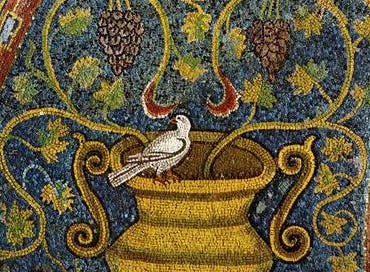


Haven’t listened for some time and finally made the time to listen to this price at breakfast and I’m always surprised how things comes at the right moment. Feeling very deeply your understanding of doubt, feeling I’ve been with it for sometimes now wondering if I am brave enough for its embrace, moving through and with it.
Loved that say « the braves have doubt but doubt has the weak »
Such a pleasure to listen to your voice
I love this piece.